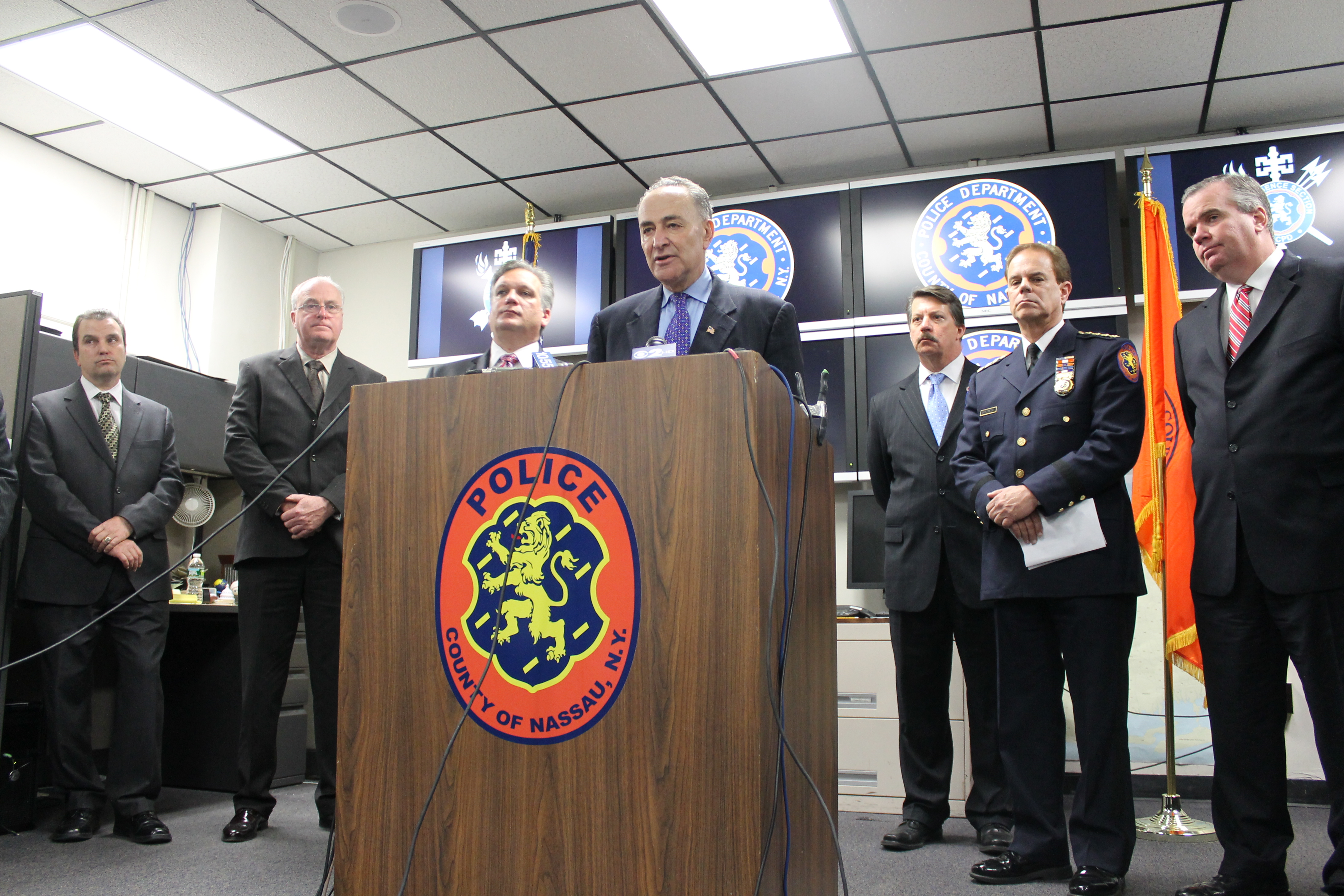

Sen. Chuck Schumer (D-NY) calls for tighter security at small pharmacies during press conference in Massapequa on Wednesday (Picture by: Rashed Mian/Long Island Press)
Sen. Charles Schumer (D-NY) called for a three-pronged attack on the prescription drug abuse “plague” on Long Island on Wednesday, including tighter security at small drug stores, better collaboration between local police and federal authorities and increasing the punishment for pharmacy robberies in order to stem the crisis.
Schumer’s remarks at Nassau County police’s intelligence center in Massapequa comes less than a week after a man was killed after he robbed a Seaford pharmacy. A federal agent, who was out running errands for his father at the time, confronted the man and was later gunned down in what has been reported as a “likely” case of friendly fire.
The tragic New Year’s Eve incident was the second fatal pharmacy robbery on Long Island last year. On Father’s Day, David Laffer shot and killed four people before walking out of with thousands of prescription drugs, as his wife, Melinda Brady, waited in the car.
“What this points to is a dramatic change in drug abuse here on Long Island, in New York and in America,” said Schumer, who was joined by Nassau County Executive Ed Mangano, new Acting Police Commissioner Thomas Dale and other police brass. He noted that prescription drugs are being used in such a great amount that it’s “killing more people than heroin, or crack or cocaine. Prescription drug abuse has become the scourge of our young people.”
The latest fatal drug store shooting highlights the dangers small mom-and-pop pharmacies face without the funds necessary to improve security systems, officials said. Compounding the issue is the fact that commonly abused prescription painkillers, like Oxycontin and Vicodin, are not illegal. People are getting addicted “legally,” said Schumer.
Since August, there has been six cases of pharmacy robberies in Nassau County, a police spokesman said. All those cases have been closed, including the Seaford case. The number of pharmacy robberies in Suffolk was not immediately available.
“We don’t need another tragedy like the one we saw this weekend to know the obvious,” Schumer said.

Senator Chuck Schumer talks about the prescription drug problem on Long Island (Photo by: Rashed Mian/Long Island Press)
The senator suggested that the federal Drug Enforcement Agency provide small pharmacies with guidelines to help drugstores protect pharmaceuticals and their employees, and to also share information with local law enforcement.
Schumer’s plan is also to increase the maximum sentence of drug store robberies to up to 20 years in prison. He said he wants to “make sure that the law enforcement at the federal level catches up with the reality.”
But DEA agents in New York said they are already sharing information with Nassau and Suffolk police as well as educating pharmacy owners about robberies by holding educational seminars, an initiative that has been going on for more than a year.
“When you have an addict, that person is just bent on trying to get the drugs and get it as quickly as possible and get out of there,” Acting Special Agent In-Charge Wilbert Plummer of the New York field office told the Press. The seminars mostly include information on what to do if a pharmacy is being robbed, said Plummer, adding that “most of the time these people are always armed.”
Their message: Remain calm and don’t try to confront the robber.
Schumer recommended that pharmacies equip their shops with silent alarms, timed safes and bullet-proof glass that separate the customer from the pharmacist.
But many small stores can’t afford that type of security, and some businesses, like banks, explained Plummer, choose not to add bullet-proof glass because it limits interaction with customers.
“Most banks, to prevent a robbery, they can put up bullet proof glass, but it’s still impractical,” he said. “Some of these businesses want to have some kind of communication with the public.”
Plummer noted that pharmaceutical diversion cases saw a 657 percent spark on Long Island this year. In New York State the increase spiked to more than 200 percent.





